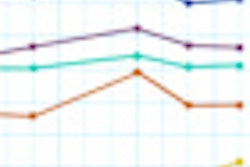The recent slowdown in the growth of healthcare costs in the U.S. could be a sign of long-term trends rather than a result of the recession, according to a new research paper in Health Affairs. If the hypothesis is correct, it could mean that the U.S. could save as much as $770 billion in Medicare spending over the next 10 years.
In the past decade, the cost of healthcare in the U.S. has not increased as a share of the country's gross domestic product (GDP), noted David Cutler, PhD, and co-author Nikhil Sahni from Harvard University. Before this period, healthcare costs grew 1.5% to 2% faster than GDP, starting as far back as 1960.
The assumption has been that this deceleration is due to the effects of the recession. But Cutler and Sahni's study attributed only 37% of the slowdown to the recession; instead, they believe most of the decrease has been due to a decline in the adoption of new treatments, as well as increased efficiency by healthcare providers (Health Affairs, May 6, 2013).
"For whatever reason, the technology that's available for treating people seems to be improving at a slower rate than in the past," Cutler said in a statement. "In recent years, there have been a number of oncology drugs that have been touted as potential blockbusters, but most haven't sold as well as expected."
Also, pharmaceutical companies have dramatically increased R&D spending, but the number of new drug approvals has remained flat. More savings may come from the implementation of the Affordable Care Act, which has given providers additional incentives to save money.
The upshot of these trends is that estimates on healthcare spending growth by the Congressional Budget Office and the U.S. Centers for Medicare and Medicaid Services could be off by hundreds of billions of dollars, according to the authors. This could have positive effects, as lower spending could reduce pressure on government budgets, and also enable companies to direct money back to workers in the form of increased salaries.



















